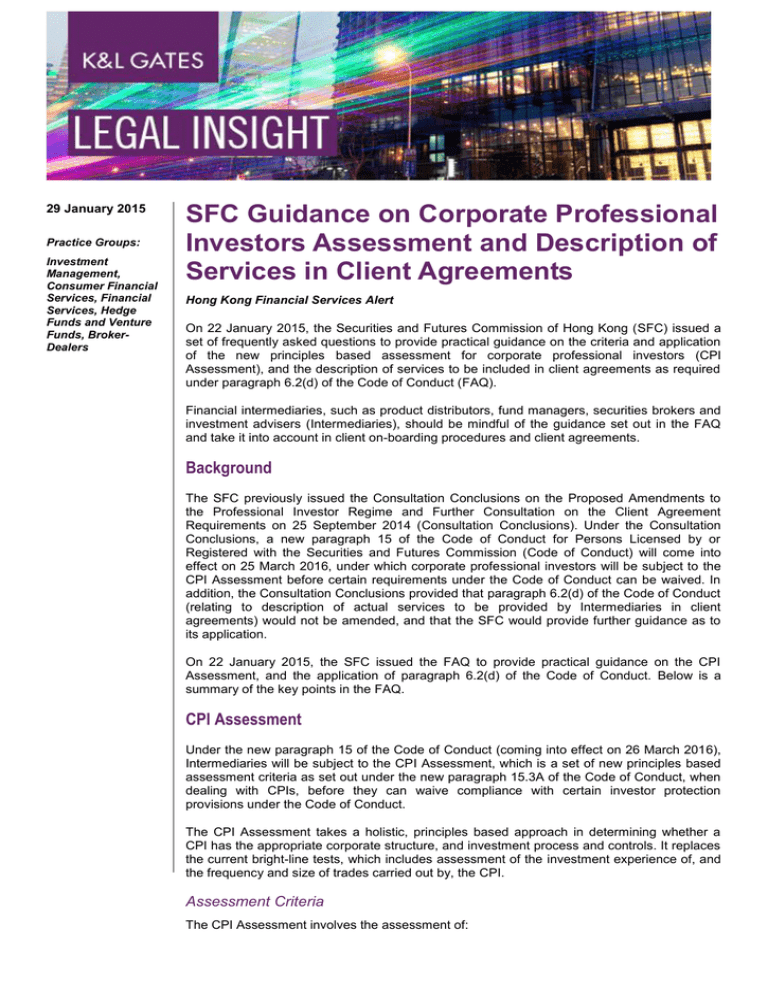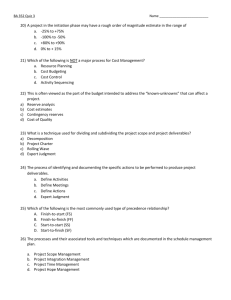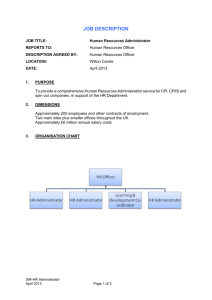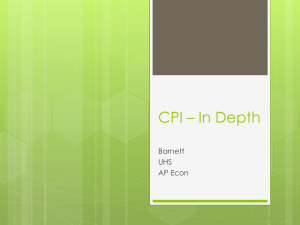
29 January 2015
Practice Groups:
Investment
Management,
Consumer Financial
Services, Financial
Services, Hedge
Funds and Venture
Funds, BrokerDealers
SFC Guidance on Corporate Professional
Investors Assessment and Description of
Services in Client Agreements
Hong Kong Financial Services Alert
On 22 January 2015, the Securities and Futures Commission of Hong Kong (SFC) issued a
set of frequently asked questions to provide practical guidance on the criteria and application
of the new principles based assessment for corporate professional investors (CPI
Assessment), and the description of services to be included in client agreements as required
under paragraph 6.2(d) of the Code of Conduct (FAQ).
Financial intermediaries, such as product distributors, fund managers, securities brokers and
investment advisers (Intermediaries), should be mindful of the guidance set out in the FAQ
and take it into account in client on-boarding procedures and client agreements.
Background
The SFC previously issued the Consultation Conclusions on the Proposed Amendments to
the Professional Investor Regime and Further Consultation on the Client Agreement
Requirements on 25 September 2014 (Consultation Conclusions). Under the Consultation
Conclusions, a new paragraph 15 of the Code of Conduct for Persons Licensed by or
Registered with the Securities and Futures Commission (Code of Conduct) will come into
effect on 25 March 2016, under which corporate professional investors will be subject to the
CPI Assessment before certain requirements under the Code of Conduct can be waived. In
addition, the Consultation Conclusions provided that paragraph 6.2(d) of the Code of Conduct
(relating to description of actual services to be provided by Intermediaries in client
agreements) would not be amended, and that the SFC would provide further guidance as to
its application.
On 22 January 2015, the SFC issued the FAQ to provide practical guidance on the CPI
Assessment, and the application of paragraph 6.2(d) of the Code of Conduct. Below is a
summary of the key points in the FAQ.
CPI Assessment
Under the new paragraph 15 of the Code of Conduct (coming into effect on 26 March 2016),
Intermediaries will be subject to the CPI Assessment, which is a set of new principles based
assessment criteria as set out under the new paragraph 15.3A of the Code of Conduct, when
dealing with CPIs, before they can waive compliance with certain investor protection
provisions under the Code of Conduct.
The CPI Assessment takes a holistic, principles based approach in determining whether a
CPI has the appropriate corporate structure, and investment process and controls. It replaces
the current bright-line tests, which includes assessment of the investment experience of, and
the frequency and size of trades carried out by, the CPI.
Assessment Criteria
The CPI Assessment involves the assessment of:
SFC Guidance on Corporate Professional Investors Assessment and
Description of Services in Client Agreements
whether the CPI has the appropriate corporate structure and investment process and
controls
whether the person(s) responsible for making investment decisions on behalf of the CPI
has(have) sufficient investment background
whether the CPI is aware of the risks involved, to be considered in terms of the person(s)
responsible for making investment decisions.
Practical Considerations
In the FAQ, the SFC sets out the following practical considerations as guidance for
Intermediaries to determine whether the CPI Assessment has been appropriately conducted:
(a)
An Intermediary should exercise professional judgment to classify products and
markets into different categories (by taking into account the nature, features and risks
of such products and markets), and apply the relevant classification to the CPI.
(b)
In considering whether a CPI would be more likely to be regarded as having an
"appropriate corporate structure" and substantive "investment process and
investment controls", an Intermediary should consider whether it:
(c)
(d)
(i)
has an in-house treasury, investment or similar function comprising of
competent and suitably qualified professionals responsible for its investment
strategies and process
(ii)
has an investment committee comprising of competent and suitably qualified
professionals responsible for its investment strategies and process
(iii)
engages an external investment advisory team comprising of competent and
suitably qualified professionals responsible for its investment strategies and
process, and this external team is: (1) independent of the Intermediary; (2)
subject to regulatory oversight (if required); and (3) serving in the capacity of
an investment advisory to the Corporate Professional Investor
(iv)
relies on and follows the investment strategies, advice and recommendations
of its related corporation, provided that the related corporation is able to
comply with either (i), (ii) or (iii) above.
An Intermediary should take a holistic approach, and take into account the following
factors when assessing the background of the person responsible for making
investment decisions on behalf of the CPI and whether that person is competent and
suitably qualified:
(i)
the person's investment experience and history, directly relevant and related
to the relevant products and markets
(ii)
the person's work experience in the financial sector, directly relevant and
related to the relevant products and markets
(iii)
the person's academic and professional qualifications, directly relevant and
related to the relevant products and markets.
An Intermediary should not rely totally on written representations, and should
holistically review and assess the information and documents provided (including
maintaining a proper audit trail of the enquiries made and information obtained, and
SFC Guidance on Corporate Professional Investors Assessment and
Description of Services in Client Agreements
producing a written account and conclusions) to determine whether the CPI
Assessment criteria are satisfied.
(e)
In the event where the CPI is effectively controlled by a single individual or a small
number of individuals and lacks the necessary substantive investment processes and
controls, it is unlikely that it will satisfy the CPI Assessment criteria, even if the
individual(s) is/are financially experienced.
Description of Services in Client Agreements
Under the Code of Conduct, Intermediaries are required to enter into a written agreement with
each client before services are provided to the client (Client Agreement), unless otherwise
exempt. As prescribed under paragraph 6.2(d) of the Code of Conduct, a Client Agreement
should contain "a description of the nature of services to be provided to or available to the
client". In the Consultation Conclusions, there have been proposals to amend paragraph
6.2(d) to require clear descriptions, and disallow contractual terms that are inconsistent with
the Code of Conduct obligations or that mis-describe the actual services, in Client
Agreements. The SFC decided not to proceed with amendments to paragraph 6.2(d) and
instead provide guidance in the FAQ regarding the application of paragraph 6.2(d).
With regards to the application of paragraph 6.2(d), the SFC stated in the FAQ that:
(a)
Intermediaries are only expected to include descriptions of services that are relevant
to the regulated activities for which they are licensed or registered to engage in.
(b)
Intermediaries are not expected to include descriptions of services that fall outside
the scope of regulated activities.
(c)
Intermediaries should clearly and accurately describe in Client Agreements the nature
of the account, the types of services relating to the relevant regulated activities to be
provided, the nature of the relationship; and the types of financial products involved.
(d)
Intermediaries who provide different types of regulated services under a Client
Agreement through different types of accounts should set out in specific terms the
types of those services to be provided through each particular type of account.
Looking Forward
The practical considerations set out in the FAQ provide clarity on what Intermediaries are
expected to do to comply with the CPI Assessment criteria and the requirement under
paragraph 6.2(d) of the Code of Conduct in relation to Client Agreements. Intermediaries are
reminded to review their current assessment procedures in relation to CPIs and their Client
Agreements to ensure that the considerations set out in the FAQ have been taken into
account.
SFC Guidance on Corporate Professional Investors Assessment and
Description of Services in Client Agreements
Author
Michael P. Wong
michael.wong@klgates.com
+852.2230.3529
Anchorage Austin Beijing Berlin Boston Brisbane Brussels Charleston Charlotte Chicago Dallas Doha
Dubai Fort Worth Frankfurt
Harrisburg Hong Kong Houston London Los Angeles Melbourne Miami Milan
Moscow Newark New York Orange County Palo Alto Paris Perth
Pittsburgh Portland Raleigh Research
Triangle Park San Francisco São Paulo Seattle Seoul Shanghai Singapore Spokane
Sydney Taipei Tokyo
Warsaw Washington, D.C. Wilmington
K&L Gates comprises more than 2,000 lawyers globally who practice in fully integrated
offices located on five continents. The firm represents leading multinational corporations,
growth and middle-market companies, capital markets participants and entrepreneurs in
every major industry group as well as public sector entities, educational institutions,
philanthropic organizations and individuals. For more information about K&L Gates or its
locations, practices and registrations, visit www.klgates.com.
This publication is for informational purposes and does not contain or convey legal advice. The information herein should
not be used or relied upon in regard to any particular facts or circumstances without first consulting a lawyer.
©2015 K&L Gates LLP. All Rights Reserved.





